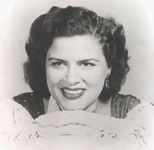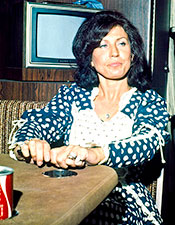
Women in Country Music
Cline achieved significant crossover success on the popular music charts, perhaps because Decca frequently backed her songs with lush strings and background vocals, both of which lent her music a more pop-oriented sound. In 1963, a plane crash cut short Cline's life and her remarkable career as a recording artist. She was 30.
For the most part, songs performed by female country singers in the 1960s and 1970s were about traditional relationships, remaining faithful, and maintaining the sanctity of the home. Songs such as Tammy Wynette's "Stand By Your Man ♫" (1968, co-written by Wynette and Billy Sherrill) are representative of this perspective. However, some female country singers in the 1960s and 1970s wrote and sang songs that showed an increasing sense of sexual, romantic, and professional liberation. Singer and songwriter Linda Hargrove invited her lover to stay the night in "Just Get Up and Close the Door ♫" (1975), and her "Mexican Love Songs" (1977) also describes the aftermath of a sexual encounter.
Loretta Lynn recorded a number of songs that promoted feminism and women's freedom, such as "Don't Come Home a-Drinkin' with Lovin' on Your Mind ♫" (1967) and "The Pill ♫" (1975). "The Pill ♫" was one of the first songs in any music genre to speak openly about the birth control pill. Lynn also wrote or co-wrote most of her music.
One of the most iconic female country music stars of the era was Dolly Parton. Raised in crushing poverty in Tennessee, Parton took a bus to Nashville the day after she graduated from high school, set on becoming a star. After recording a few country songs at Monument Records, Parton joined The Porter Wagoner Show. She replaced Norma Jean Beasler (or Pretty Little Norma Jean) as Wagoner's "girl singer," but soon, she was a featured performer on the show. Parton began recording for RCA, and she wrote most of the songs that she recorded. Parton's talents were wide-ranging: she could yodel on her cover of Jimmie Rodgers's classic "Mule Skinner Blues ♫" (1970), or she could sing plaintively about heartbreak and separation in "I Will Always Love You ♫" (1974).
"I Will Always Love You ♫" was actually written as a tribute to Porter Wagoner when Parton left his show in order to pursue a solo career. In many of her songs, Parton addresses issues faced by women in sensitive and compelling ways. "9 to 5 ♫" (1980), for example, addresses the difficulties of the working woman. Parton also sang often of her roots and her impoverished childhood, which is perhaps best captured in her "Coat of Many Colors ♫" (1971) which describes how her mother sewed a coat for her made from patches of rags.
During the 1970s, Parton began reaching into pop markets in order to increase her crossover appeal. Although she never abandoned her country roots in the topics of her songs or in her vocal delivery style, her music from the late 1970s on reflects an increased pop orientation. (Compare the instrumentation of "Coat of Many Colors ♫" and "9 to 5 ♫," for example.)






